Are you looking for a reliable marketplace multivendor plugin? Check out this detailed Dokan vs. Woo Product Vendors guide to make an informed decision for your new venture.
A marketplace usually includes a lot of functionalities. It provides a diverse platform for administrators, vendors, and customers. For a beginner, it may seem difficult to build and run a multivendor marketplace. However, having the right marketplace platform can make your work easier to a great extent.
Two prominent contenders in the realm of multi-vendor marketplace solutions are Dokan Multivendor and Woo Product Vendors.
In this post, we’ll explain how these two platforms work, show their relative benefits and drawbacks, and help you choose the right one for your needs.
Let’s get started!
⏳In a hurry? ⏩ Jump to the comparison table and get a quick recap of these two exclusive multivendor plugins, and pick the right one for your business.
Dokan vs Woo Product Vendors: Short Overview
First, let me introduce you to these two powerful marketplace plugins at a glance:
What is “Dokan Multivendor”?
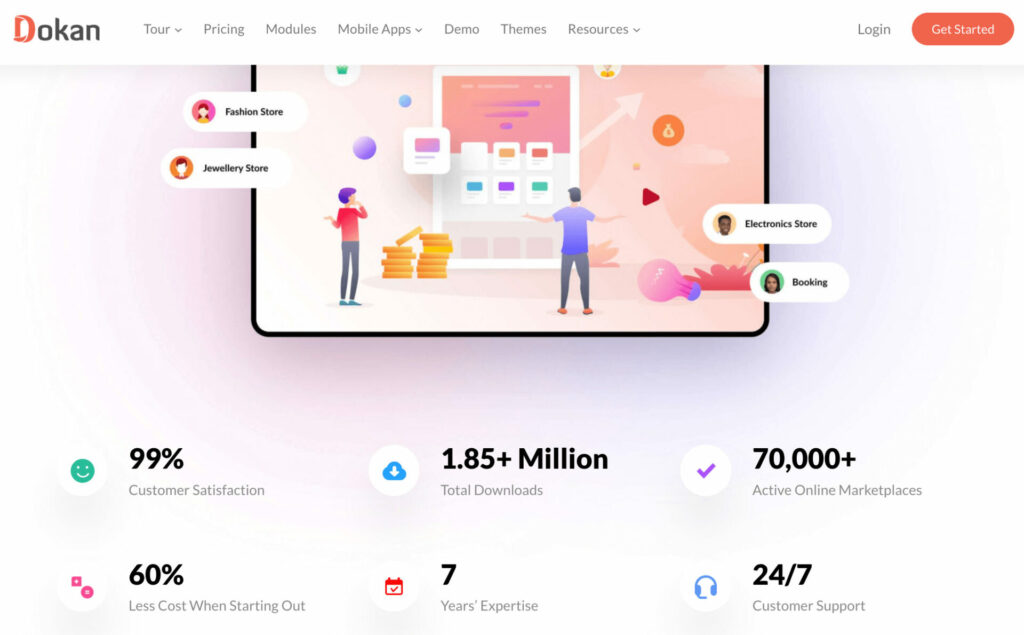
Active Installations: 60,000+
Latest Version: 3.9
Ratings: 4.6 (668)
Dokan Multivendor is a widely popular WordPress plugin that enables you to build a dynamic multi-vendor marketplace. Dokan Multivendor lets you build any type of marketplace, including digital products, physical goods, booking platforms, service-based solutions, or anything you can think of.
No matter the size of your business, Dokan offers a versatile solution with advanced vendor management system, robust payment gateways, wide range of customer management tools, and many more.
With Dokan, you can empower individual sellers to sell their products directly on your site and create a diverse shopping experience for your customers.
What is “Woo Product Vendors”?
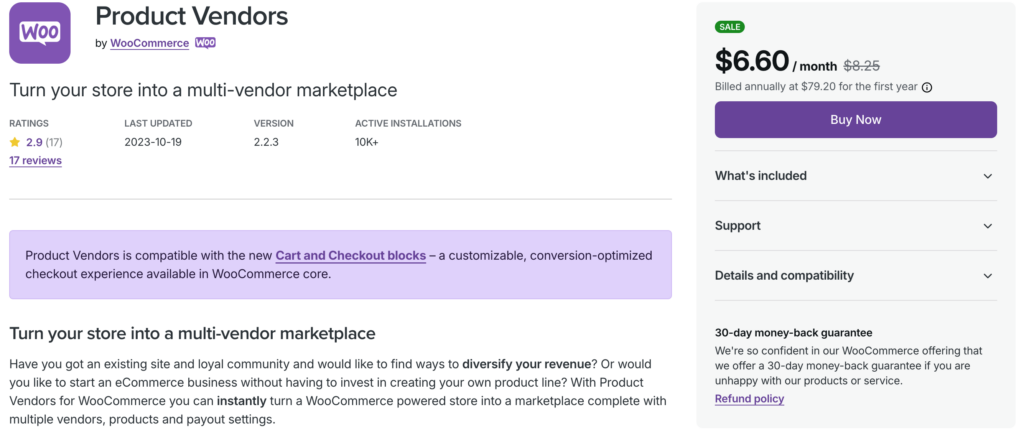
Active Installations: 10,000+
Latest Version: 2.2.3
Ratings: 2.9(17)
Woo Product Vendors is a popular WordPress plugin that enables you to transform your WooCommerce store into a multi-vendor marketplace. It allows you to earn commission from your vendors’ sales, define specific commission rates for individual vendors, provide each vendor with control over their profile, and much more.
Using Woo Product Vendors, you can create and edit vendors, set commission rates for vendors, and display vendors’ ratings. Vendors will have the flexibility to control and customize their public profile, view sales reports and order status, etc.
📚 Related Resource: Why eCommerce Businesses Fail & How to Resolve Them.
Dokan vs Woo Product Vendors: Key Features, Similarities and Differences
As you can see, both Dokan and Woo Product Vendors enable you to build a multivendor marketplace. Using either plugin, you can seamlessly manage multiple vendors, allow them to create and manage their own product listings, handle orders and shipping, and receive payouts.
So, which one should you pick?
The best way to determine the ideal plugin for your multivendor marketplace is to thoroughly evaluate both options. Below you’ll find a detailed list of important features, functions, and drawbacks of Dokan vs. Woo product vendors.
Here are the comparison categories we’ll discuss today:
- Ease of Use & Dashboard
- Themes and Customization
- Vendor Management & Onboarding
- Modules & Extensions
- Payment Gateways & Vendor Withdraw Systems
- Frontend Order & Product Management
- Delivery and Shipping
- Customer Support, Documentation and Community
- Security, Backup & Performance
- Pricing
Now let’s get started with the first point-
1. Ease of Use and Dashboard
As a marketplace owner, you may need to handle hundreds of things. In that case, it’s important to use a marketplace solution that gives you an easy way to manage different parts of your business.
Let’s see what Dokan and Woo Product Vendors offer in this manner:
Dokan Multivendor
Dokan Multivendor is super easy to use. Just download the plugin from WordPress.org or install it directly in your WordPress dashboard. The setup wizard guides you through multiple steps, with helpful tips in each step.
The admin dashboard is nicely organized and user-friendly. You’ll find several useful options there, and the tooltips will help you operate all the functions. Also, using the live search feature in the dashboard, you can find your desired setting option very quickly.
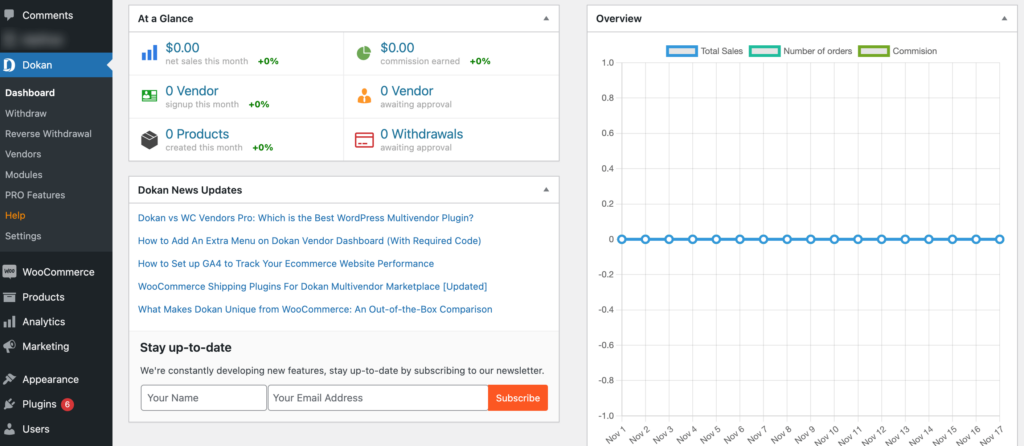
To be specific, the Dokan dashboard provides an overview of all key metrics and activities of your marketplace.
Woo Product Vendors
Woo Product Vendors is a premium extension of WooCommerce. It allows multiple vendors to sell their products on your eCommerce platform. Such as physical stuff, hand-made items, digital downloads, etc. You can set specific commission rates for different vendors and earn commission from your vendors’ sales.
All you need to do is buy the plugin from your WooCommerce.com account. Then upload the downloaded file to your WordPress dashboard by navigating to WordPress Admin → Plugins → Add New. Finally, activate the extension.
Setting up the plugin is relatively straightforward. Regardless of your technical expertise, you can build and operate any marketplace with ease. The admin dashboard is well-organized and provides clear navigation to manage vendors, products, and orders.
2. Themes and Customization
You need a beautiful theme for your marketplace that relates to your niche. WordPress has a large library of themes, but every marketplace solution doesn’t work well with all themes. Also, you may need to modify the theme design as per your needs.
This is the reason you should know about the customization facilities of a plugin before installing it on your site:
Dokan Multivendor
Dokan Multivendor works seamlessly with any WooCommerce theme. So you’ll have a wide library to find a design that compliments your brand. Moreover, the Dokan multivendor has themes like Otel and Dokani. You can use these themes to give your website a more professional look.
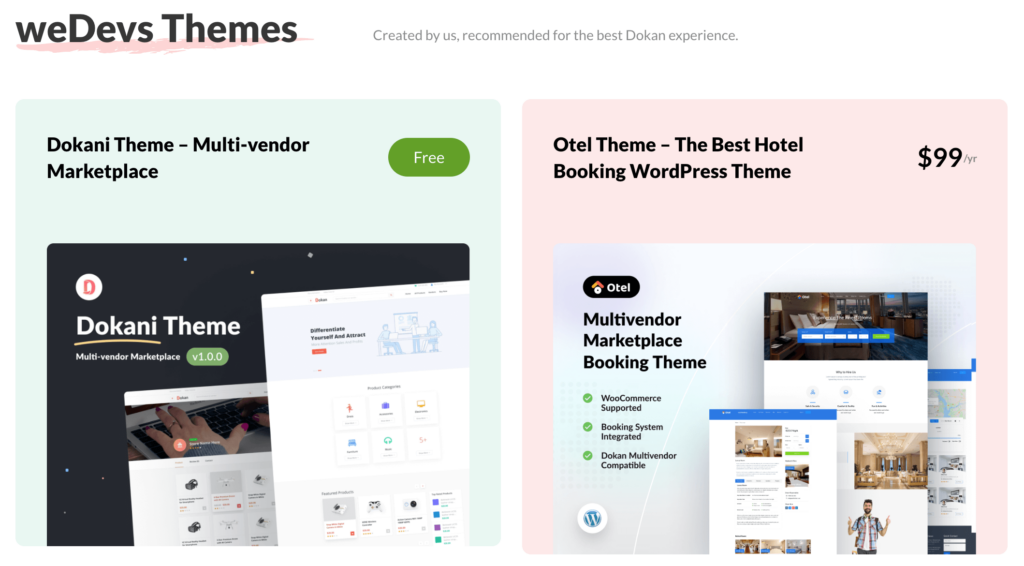
Besides, you’ll find many Dokan-compatible themes from ThemeForest specially designed for multi-vendor marketplaces.
And don’t worry, Dokan Multivendor looks good on phones too. So, people can easily check out your marketplace on their mobiles!
Woo Product Vendors
Customizations are limited within Woo Product Vendors. However, it works well with most WooCommerce-compatible themes. So you’ll get the chance to give your store an appealing look.
While the plugin itself doesn’t offer extensive theme customization options, you can rely on WooCommerce’s broader ecosystem of themes and extensions for more design flexibility.
📚 Related Resource: 7 Themes for WooCommerce That Enhance User Experience.
3. Vendor Management and Onboarding
One crucial part of any marketplace is managing vendors. You need a robust vendor management system to onboard multiple sellers. And then enable them to sell their products in a simple way with a secured transaction process and ensure other facilities too.
You’ll get many exclusive features regarding vendor management with both Dokan and Woo Product Vendors. Such as-
Dokan Multivendor
With Dokan, you can efficiently manage an unlimited number of vendors, their products, and orders from a single platform.
Dokan provides a default vendor registration form. As an admin, you have to allow the form to appear on the site. So, people who want to sell products or services on the platform can easily sign up. You can even customize the form design to match your special requirements or brand image.
If a user applies to be a vendor, they have to go through a step-by-step vendor setup wizard and provide all the relevant details about their store.
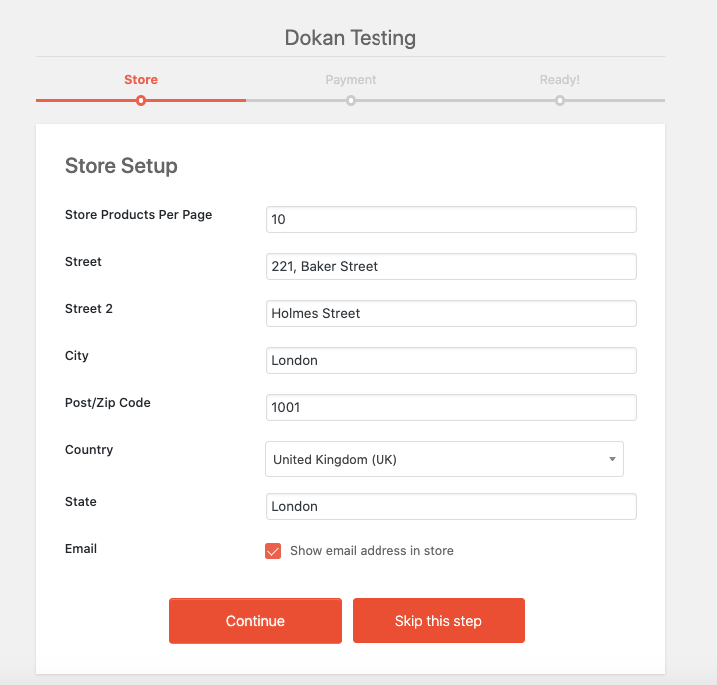
After that, the admin reviews the submitted information to ensure it meets the marketplace’s standards. This admin approval process maintains quality control and consistency within the marketplace.
Once it is approved, every vendor receives a mini-store along with a personalized front-end dashboard. Vendors can manage their stores, from product listings to order fulfillment, right from this dashboard.
Woo Product Vendors
The plugin offers a robust vendor management system. As an admin, you can easily add new vendors, set commission rates, and monitor their performance through the admin dashboard.
The platform gives a default vendor registration form so sellers can enroll in your marketplace. However, store owners can manually add and create a vendor.
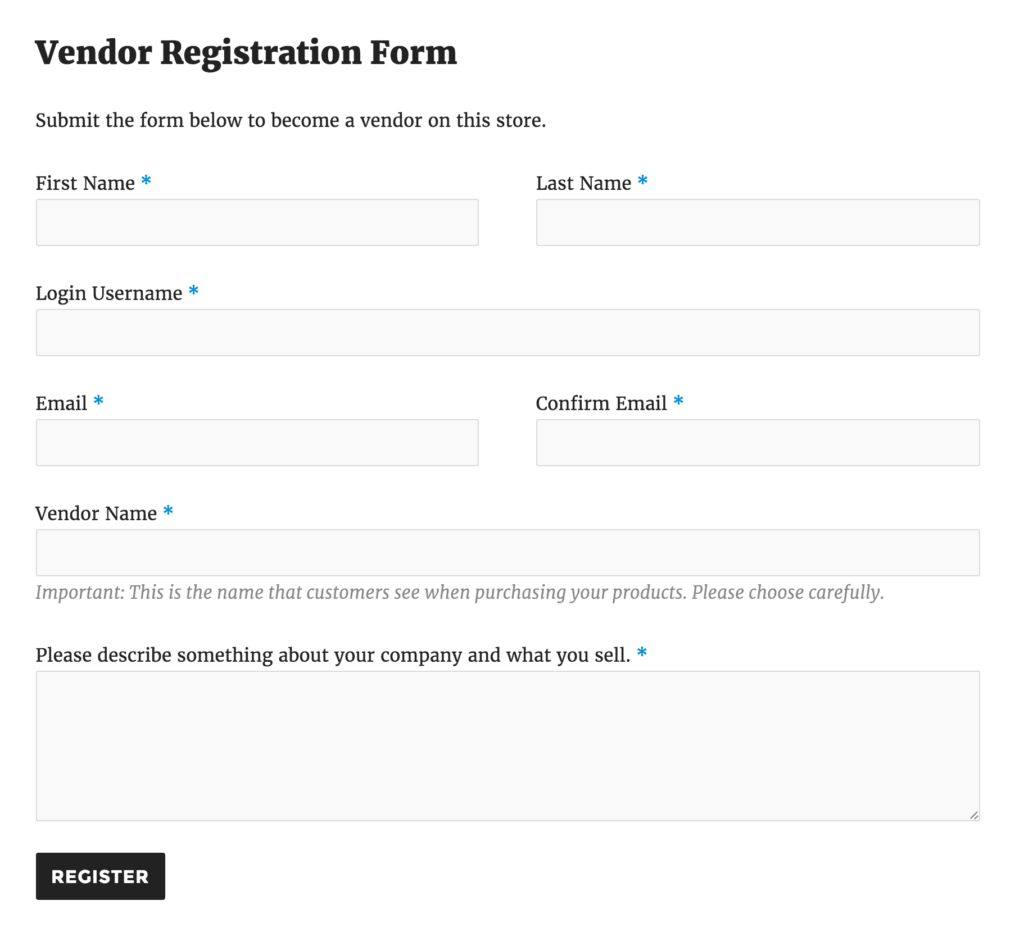
After registration, each vendor will get a personal profile and page for their store. From their own admin interface, vendors can manage their products, view sales reports, and much more. This will reduce an admin’s workload. They don’t need to configure the product settings of individual vendors anymore.
As an admin, you can set different roles for your vendors, like Vendor Admin or Vendor Manager. There are also options to assign individual tasks to the vendors. Such as which vendor user is allowed to publish products live with or without approval.
Or you can determine whether the vendor can manage customers, including their own existing customers, and create new ones.
4. Modules and Extensions
For your growing business, you may need to extend the functionality of the marketplace. Let’s see what type of exclusive function you’ll get inside Dokan and Woo Product Vendors:
Dokan Multivendor
You can build a website with the basic features of a marketplace using Dokan Lite for free. But as your marketplace starts growing, you may need more niche-specific features for your marketplace.
In that case, you can subscribe to Dokan Pro packages and premium modules. Dokan Multivendor has 40+ exclusive modules and addons to supercharge your eCommerce business.
Dokan offers a variety of modules to help you manage your vendors more effectively, manage products, and enable many advanced functions on your site. Some Dokan modules have integration with popular payment gateways and email marketing tools. So you can reach a broad audience with extended features.

Woo Product Vendors
Woo Product Vendors can be extended with various modules and extensions available in the WooCommerce marketplace. These extensions can add features like vendor reviews, social sharing, and more. This will enhance the functionality of your multi-vendor marketplace.
5. Payment Gateways and Vendor Withdraw Systems
A marketplace includes different types of transactions, including customer payments, commission disbursals, vendors’ subscriptions, etc. Customers are also more likely to buy things from an eCommerce site that offers their preferred payment options.
Let’s see how Dokan and Product Vendors handle payments-
Dokan Multivendor
Dokan Multivendor is compatible with all WooCommerce-supported payment gateways. Besides, it seamlessly integrates with other popular payment gateways like
- PayPal
- Stripe
- Wirecard
- Stripe Express
- Razorpay
- Mangopay, etc.
These integrations are specifically designed to handle the complex transaction processes of a multivendor marketplace.
For instance, when a customer makes purchases from multiple vendors, the payment gateways are configured to accurately split the payments. It ensures that the admin receives their commission and the vendors receive their earnings accordingly.
Woo Product Vendors
Since it’s a product from WooCommerce, you can use all WooCommerce-supported payment gateways on your site. It ensures that vendors can receive payments from customers through various methods. Also, the admin gets several ways to withdraw their commissions.
Product vendors will give commissions once an order status is changed to “Completed”. This will ensure a smooth transaction between the admin and vendors.
Moreover, the plugin offers three types of payouts: weekly, quarterly, and monthly. Using these options, you can define the frequency of the payouts to vendors. For the refund process, there is an option to delay the commission payout. PayPal payouts will also help you deal with delayed payments. So that any return or refund request can be managed without any hassles.
📚 Related Resource: Top Payment Gateways for Your WooCommerce Store: A Comprehensive Guide.
6. Frontend Order and Product Management
An eCommerce marketplace typically handles thousands of products. The regular order amount is also huge. That is why, you need a marketplace solution that assists you in handling a large number of products with ease.
Let’s talk about the order management process of Dokan and Woo Product vendors-
Dokan Multivendor
Dokan Multivendor provides a comprehensive frontend order management system for vendors. Vendors can view all of their orders, their status, and other relevant information from their vendor dashboard. They can also take quick actions like viewing the details of an order, marking it as complete, or putting it on hold.
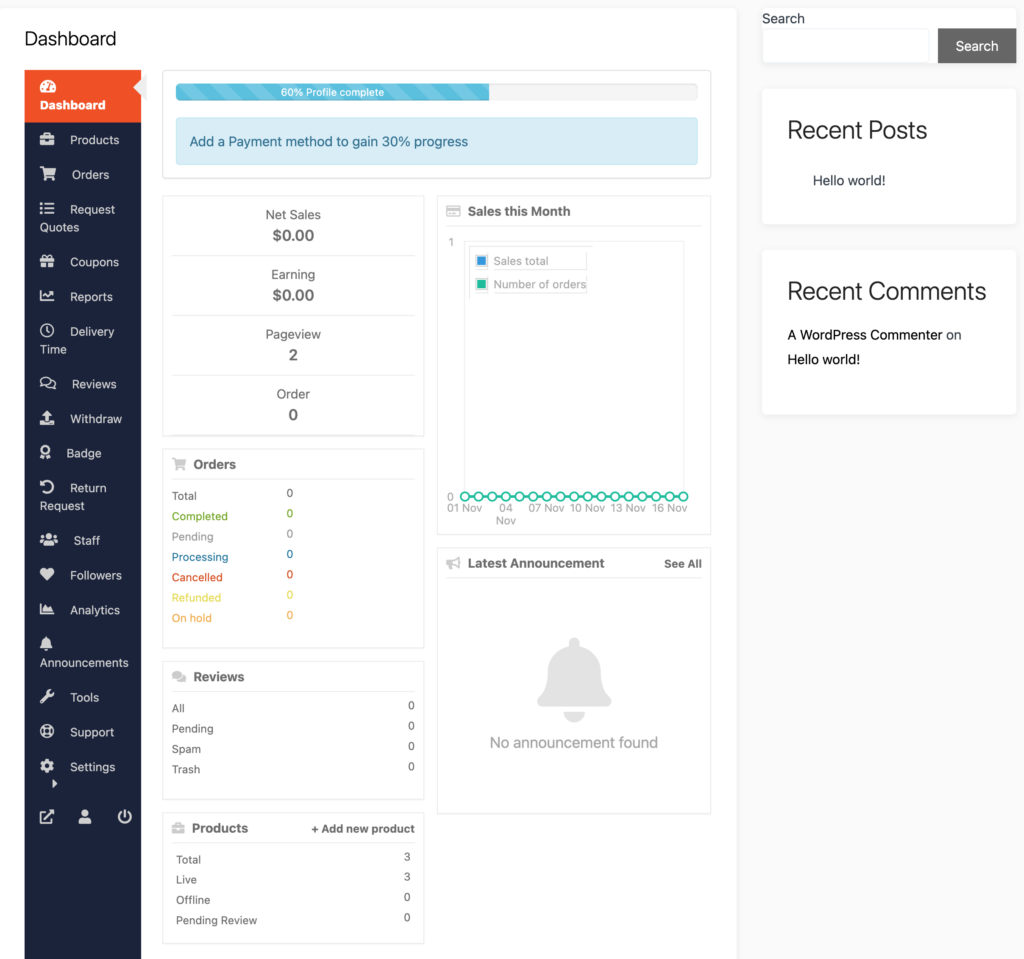
In the detailed view of an order, vendors can see all of the important information, including the customer’s name, address, phone number, email address, and the products that they ordered.
Dokan Multivendor also provides a frontend product management system for vendors. Vendors can add, edit, and delete products from their vendor dashboard. They can also manage their product categories, tags, and attributes.
Woo Product Vendors
WooCommerce Product Vendors is primarily designed to extend the functionality of WooCommerce to create a multi-vendor marketplace. While the core WooCommerce system handles many aspects of product and order management, WooCommerce Product Vendors enhances these capabilities by providing vendors with frontend access to manage their products and orders.
Here is how the WC Product Vendor handles frontend order and product management:
- Vendor Dashboard: Vendors have a dedicated dashboard on the frontend of the site where they can manage their products. This dashboard provides an intuitive interface for vendors to add new products, edit existing ones, and control various product-related settings.
- Product Submission: Vendors can submit new products directly from the frontend, including specifying product details such as titles, descriptions, prices, and images. This allows vendors to independently manage their product catalog without requiring access to the WordPress admin area.
- Product Editing: Vendors can edit and update their products directly from the frontend dashboard. This includes changing product information, adjusting inventory levels, and making other modifications as needed.
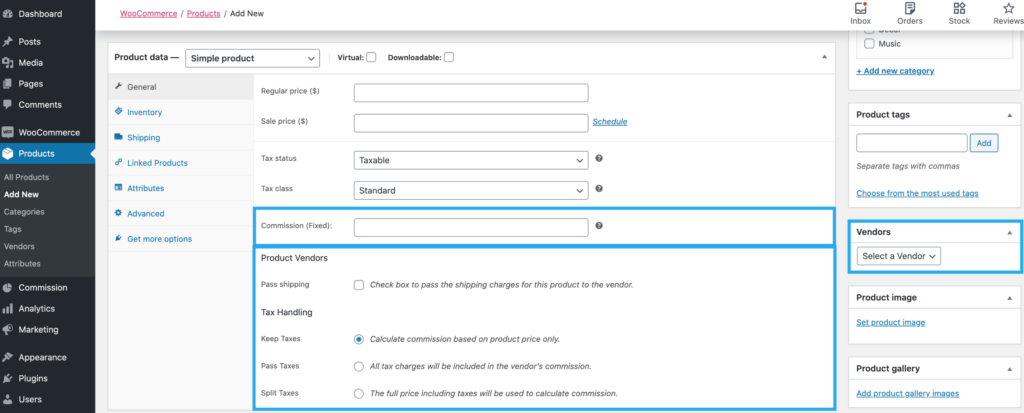
- Order Overview: Vendors can view a summary of their orders directly from the frontend dashboard. This includes information such as order status, customer details, and order totals.
- Order Details: Vendors can access detailed information about each order, allowing them to fulfill orders efficiently. This information may include the products ordered, shipping details, and any special instructions from customers.
- Order Status Updates: Vendors can update the status of orders to reflect the current stage of fulfillment. This can include marking orders as processed, shipped, or completed.
7. Delivery and Shipping
Fast and reliable shipping contributes to a positive customer experience. Luckily, you’ll get several options to ensure a smooth shipping experience for customers with both Dokan Multivendor and Product Vendors.
Dokan Multivendor
Based on the admin’s permission, vendors can configure the shipping features from their frontend vendor dashboard.
Dokan Multivendor seamlessly integrates with WooCommerce’s shipping features. Other than that, it offers zone-wise shipping capabilities. The platform also supports table-rate shipping and distance-rate shipping. It empowers vendors to establish complex shipping terms with ease.
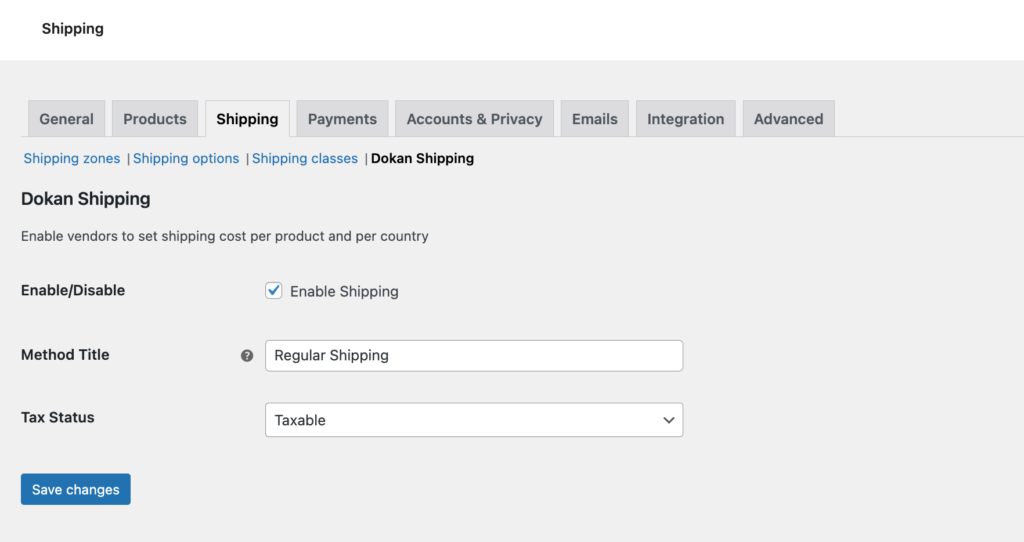
Furthermore, Dokan Multivendor provides a shipping tracking feature so customers can track their orders in real-time. The plugin integrates with renowned shipping carriers like FedEx, UPS, and USPS.
Moreover, the Delivery Time module enables users to select the date and time of delivery directly from the checkout page. It enhances their control over the delivery process.
Woo Product Vendors
When it comes to shipping methods, Product Vendors offers a flexible approach that allows each vendor to set their own shipping rules for their products. Vendors can choose from a variety of shipping methods. Such as-
- Flat rate shipping: This method charges a flat rate for shipping, regardless of the weight or destination of the order.
- Free shipping: This method offers free shipping to customers, regardless of the order amount or destination.
- Local pickup: This method allows customers to pick up their orders from the vendor’s location.
- Table rate shipping: This method charges shipping rates based on the weight and destination of the order.
- Real-time shipping: This method calculates shipping rates in real-time based on the weight, dimensions, and destination of the order.
In addition to these standard shipping methods, Product Vendors also support custom shipping methods. This allows vendors to create their own shipping rules and rates based on their specific needs.
8. Customer Support/Documentation/Community
Customer support plays a crucial role in the success of any business. Providing excellent customer support can help you to build customer loyalty and increase sales.
Dokan Multivendor
Dokan Multivendor provides various customer support options to assist its users.
- Live Chat: Dokan has a live chat option on its website. You can just visit the site and ask any question by clicking on the live chat option.
- Online Documentation: Dokan Multivendor has a comprehensive online documentation library that covers all aspects of the plugin, from installation to advanced features. The documentation is well-written and easy to follow, and it includes screenshots and videos to help you understand the concepts.
- Support Ticket: The Dokan team maintains an active support ticket system. You can submit a ticket anytime you want and will get a response from the support team within the shortest possible time.
- YouTube Videos: Dokan Multivendor also has a YouTube channel that contains tutorials on all the modules and features. Users can easily follow the videos to manage their marketplace.
- Dokan User Group: Dokan has a dedicated user group on Facebook. You can also join there and get to know all the updates from Dokan multivendor. Moreover, you can raise any question there if you need to know.
Woo Product Vendors
As it’s a premium product of WooCommerce, you’ll get all the support from the WooCommecre official site. They give 1 year of Support Service that includes assistance with product installations, configuration, and use.
Plus, there is detailed documentation to use every feature of this plugin. It offers detailed instructions, step-by-step tutorials, and troubleshooting advice. So you can easily set up and manage a successful marketplace with multiple vendors.
9. Security, Backup, and Performance
Typically eCommerce marketplaces handle a significant amount of customer data, including personal information, payment details, and purchase history. Your marketplace solution must have robust security measures to keep customer data safe from unauthorized access and breaches.
Dokan Multivendor
Dokan Multivendor uses a variety of security features to protect your data. Such as:
- Regular security updates: The Dokan team releases regular security updates to patch any vulnerabilities that are discovered.
- Code review: The Dokan team reviews all of the code that is added to the plugin to ensure that it is secure.
- Security audits: The Dokan team regularly commissions security audits to identify and fix any potential security vulnerabilities.
- Secure coding practices: The Dokan team follows secure coding practices to minimize the risk of security vulnerabilities.
Dokan Multivendor is designed to be a high-performance solution. It uses a variety of techniques to optimize performance, such as Caching, Indexing, Load balancing, etc.
Overall, Dokan Multivendor is a secure, reliable, and scalable solution for managing multiple vendors and their products. It is a good choice for businesses of all sizes.
📚 Related Resource: 8 Actionable Tips to Protect Your WordPress eCommerce Website.
Woo Product Vendors
Product Vendors is a secure and reliable plugin that can help you create a successful multi-vendor marketplace. It automatically inherits all the security features of WooCommerce. Product Vendors integrates with a number of secure payment gateways to protect your customers’ financial information.
Other key attributes of Product Vendors to ensure your marketplace security include-
- Data encryption: Product Vendors encrypt all sensitive data, such as customer passwords and payment information.
- Vulnerability scanning: Product Vendors regularly scan for vulnerabilities and give alerts.
- Security updates: Product Vendors release regular security updates to fix vulnerabilities and protect your site from new threats.
To be more specific, WooCommerce is a secured platform and maintains many security measures to keep all your data protected. As a product of WooCommerce, Product Vendors give your marketplace a strong safeguard.

Subscribe to
Dokan blog
10. Pricing
It is also important to consider the long-term costs of using a marketplace plugin. Below you’ll find the cost of both Multivendor and Woo Product Vendors.
Dokan Multivendor
Dokan Multivendor has a free version that you can download from WordPress.org or install from the WordPress dashboard. For the premium version, it has four plans –
- Starter: $149/year
- Professional: $249/year
- Business: $499/year
- Enterprise: $999/year.
Every package comes with different feature sets and levels of accessibility. Dokan Multivendor offers a 14-day no-questions-asked refund policy. This means that if you are not satisfied with the plugin for any reason, you can request a full refund within 14 days of your purchase.
Woo Product Vendors
Product Vendors is an extension of WooCommerce. It is available at an annual price of $79.
Product Vendors offer a 30-day money-back guarantee. This means that you can try the plugin risk-free and request a full refund if you are not satisfied. To request a refund, you can submit a support ticket to the Product Vendors team. They will review your request and process your refund within 24 hours.
A Detailed Comparison Table for Dokan vs Woo Product Vendors
Now you know all the main differences between Dokan and WC Product Vendor. That being said, here we are showing a comparison table so that you can get all the crucial information in one place and make your decision with more confidence.
| Features | Dokan | Woo Product Vendors |
| Demo | Yes | No |
| Support | Support ticket, email, live chat | Premium support |
| Built-in Multilingual Support | Yes | No |
| Withdrawal System | Yes | Yes |
| Built-in Refund Management | Yes | Yes |
| Admin & Vendor Report | Yes | Yes |
| Customizable Registration Form | Yes | Yes |
| Different Commission Types | Yes | Yes |
| Welcome Wizard for Vendors | Yes | No |
| Store Policy | Paid | No |
| Built-in Live Search | Paid | No |
| Product Category | Yes | Yes |
| Zone-wise Shipping | Yes | Yes |
| Vendor Admin Contact Form | Yes | No |
| Store SEO | Paid | No |
| Coupon Management | Paid | Yes |
| Ratings | 4.6 (668 reviews) | 2.9(17 reviews) |
Why You Should Choose Dokan Multivendor Over Woo Product Vendors
Dokan is a more popular plugin than Product Vendors. It has over 60,000 active installations and a 4.6-star rating on WordPress.org. Dokan is also a more feature-rich plugin than Product Vendors. It includes a number of features that Product Vendors do not, such as:
- Frontend dashboard
- Vendor dashboard customization
- Advanced order management
- Custom reports
While both Dokan Multivendor and Woo Product Vendors have their benefits, you should choose Dokan if you are looking for:
- Modern & User-Friendly Interface: Dokan provides a modern and intuitive user interface for both admins and vendors.
- Advanced Customization Options: With Dokan, you have the flexibility to customize your marketplace to suit your unique branding and functional requirements.
- Extensive Integrations: Dokan supports a number of helpful modules and has seamless integration with many third-party extensions.
- Regular Updates: Dokan has a track record of regular updates. It ensures that your marketplace remains secure and up to date.
- Cost-Effective Solution: Dokan offers a cost-effective solution for those looking to start a multivendor marketplace without breaking the bank.
But remember, the best choice ultimately depends on your specific needs and goals. So, take some time and think about what matters most to you. And don’t hesitate to explore both options further.

Dokan is Leading the Way for Almost 10 Years Now
So there you have it, folks! In conclusion, Dakon Multivendor provides more functions than Product Vendors at a reasonable cost, which allows it to get ahead.
Whether you’re a tech-savvy pro or just starting out, Dokan lets you build any type of marketplace with ease. This multivendor plugin extends the capabilities of the most popular eCommerce plugin, WooCommerce and ensure the best frontend experience to run a successful online marketplace. It is the number #1 multivendor plugin on the market right now.
To know more about the marketplace, you can also check out our guide on What is a Marketplace.
Do you still have any questions about using Dokan Multivendor to build a multivendor marketplace? Ask us in the comments section below!
Subscribe to
Dokan blog
We send weekly newsletters, no spam for sure!

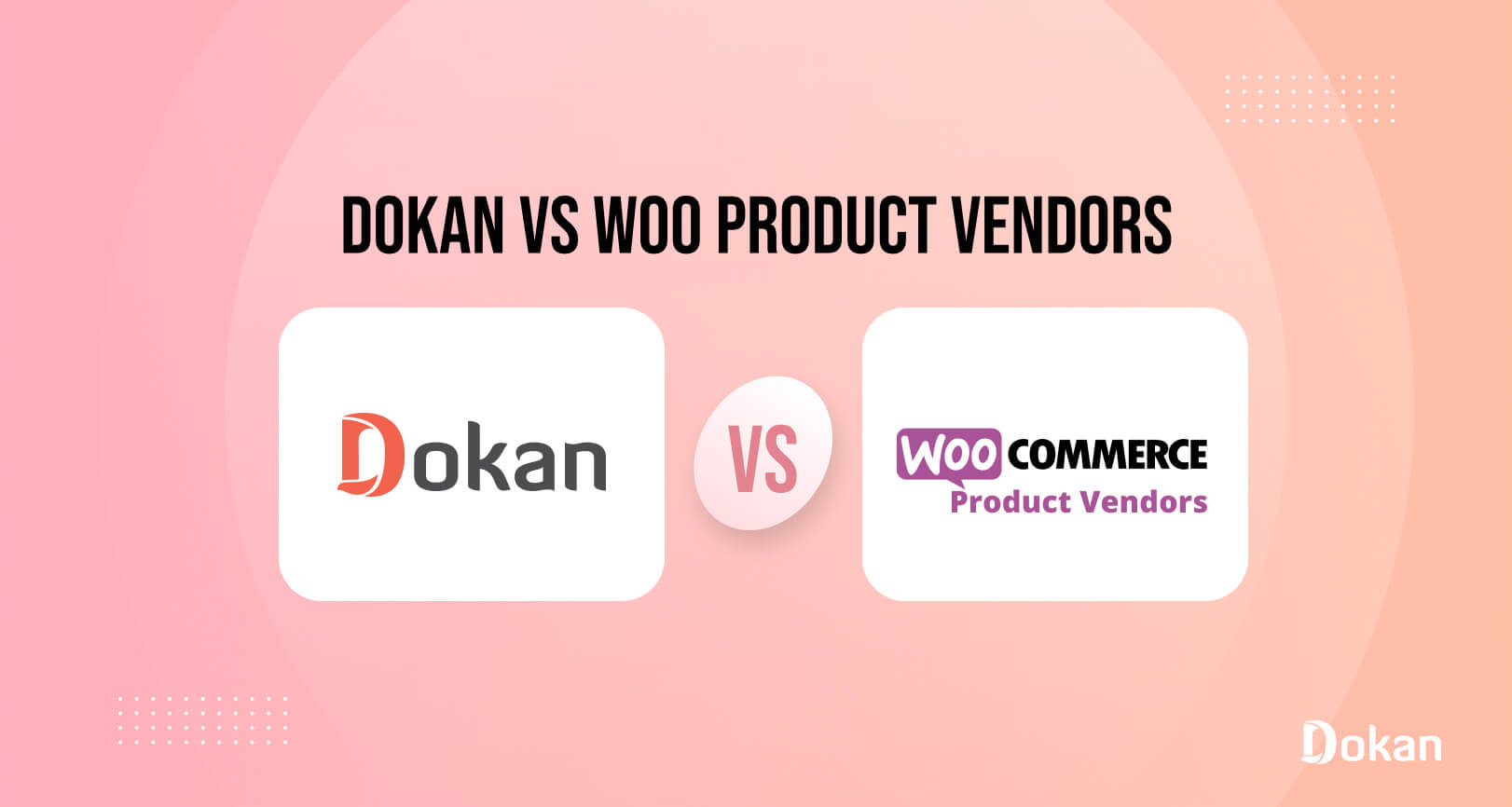

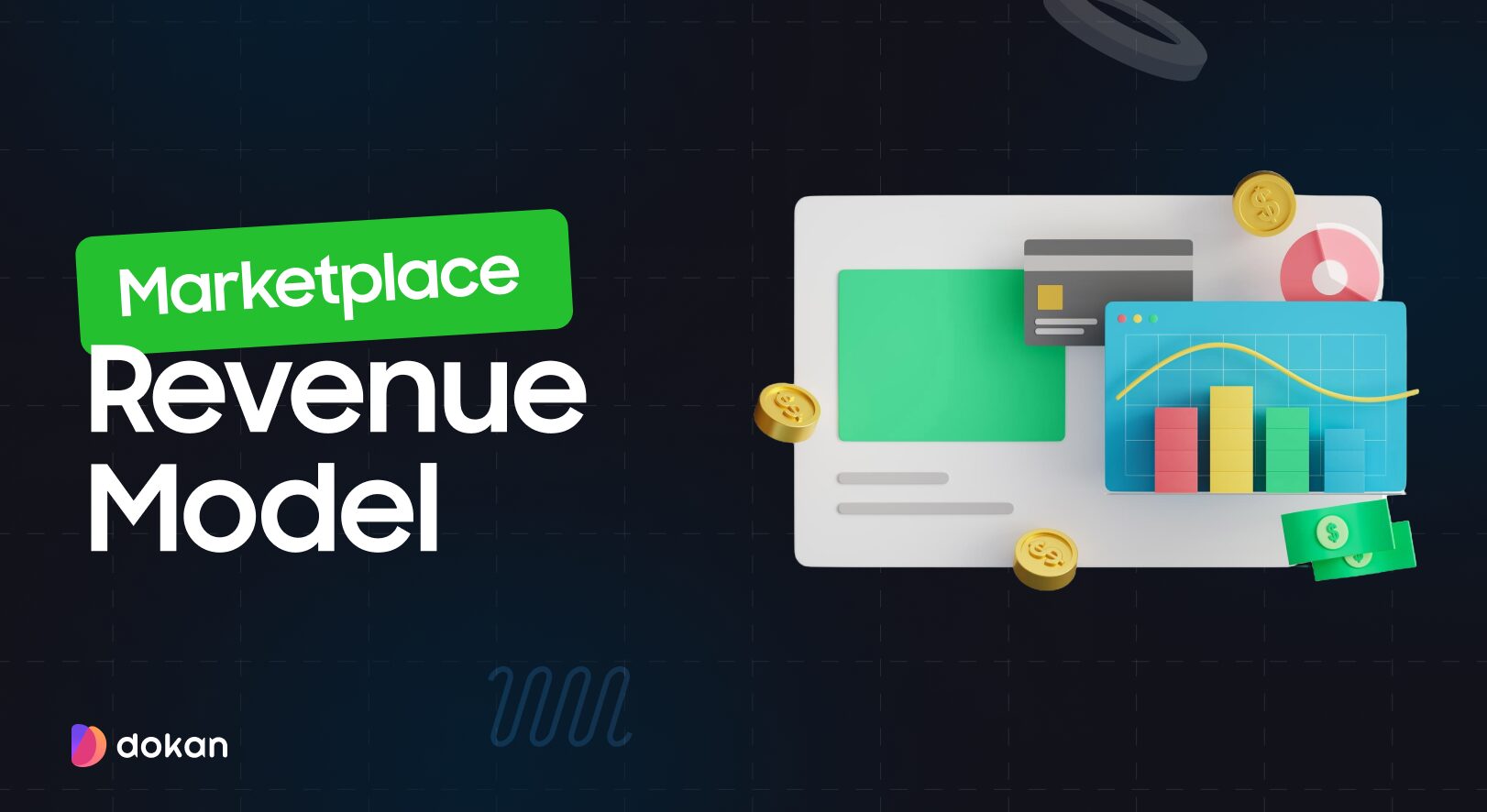
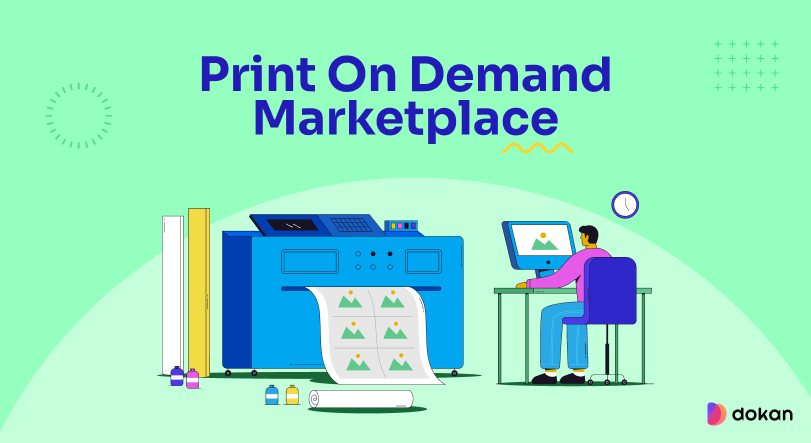
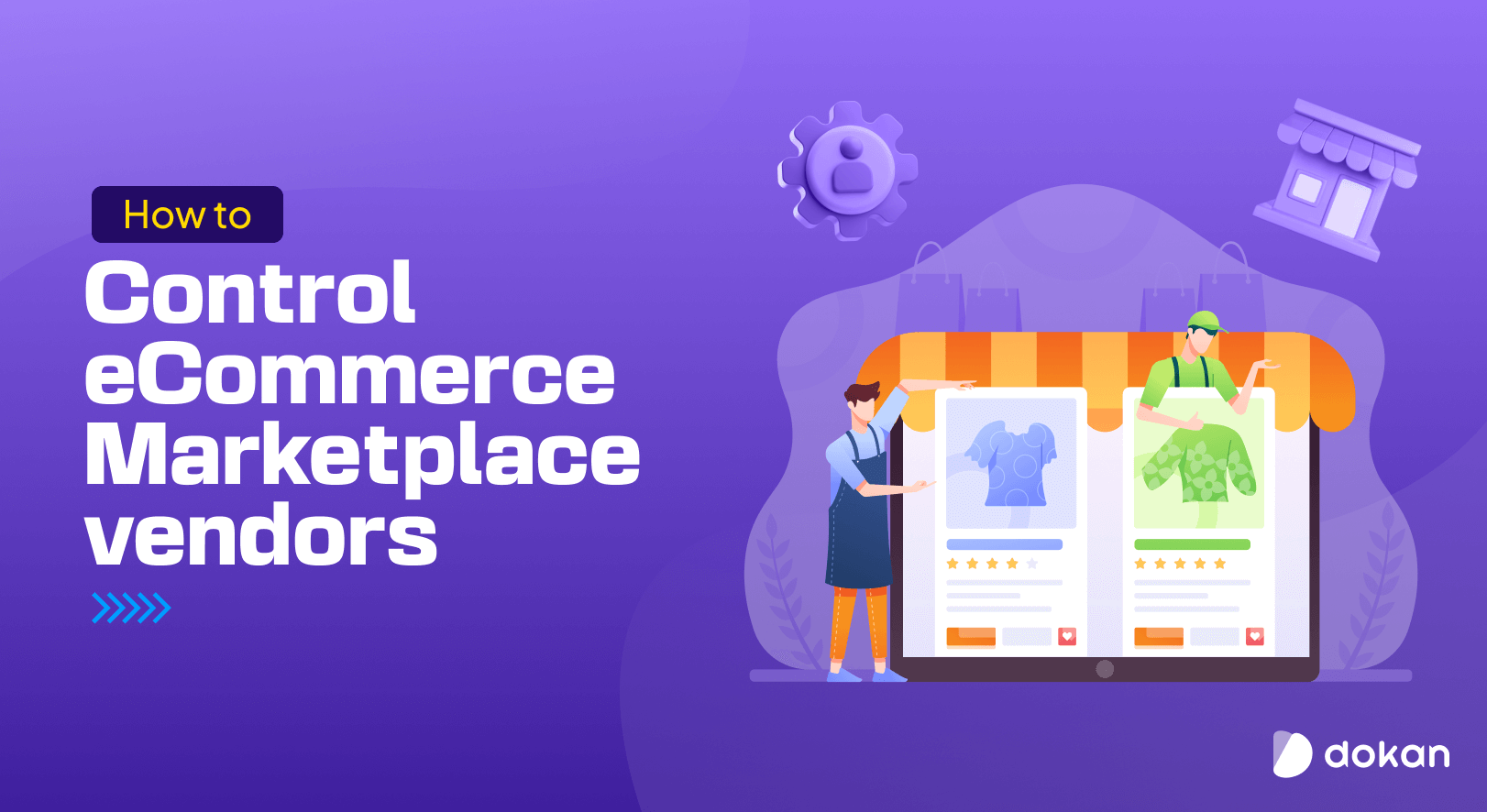

Leave a Reply